|
|
|
Sort Order |
|
|
|
Items / Page
|
|
|
|
|
|
|
| Srl | Item |
| 1 |
ID:
160899
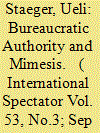

|
|
|
|
|
| Summary/Abstract |
Regional economic integration in the post-Soviet space stands in a complex relation with the European Union’s integration process. Multiple competing internal logics of integration, as well as the EU model are drivers of Eurasian regionalism. The Eurasian Economic Union illustrates how bureaucracies mobilise their technocratic authority in a process of mimesis that reconciles multiple internal and external integration logics: selective learning from the EU and successful incorporation of internal integration logics produce an organisational design and output that member states support to varying extents.
|
|
|
|
|
|
|
|
|
|
|
|
|
|
|
|
| 2 |
ID:
137426
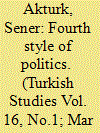

|
|
|
|
|
| Summary/Abstract |
This article discusses the political origins, present-day significance, and implications of the intellectual movement known as “Eurasianism” in Turkey, a movement with Euroskeptic, anti-American, Russophile, neo-nationalist, secularist, and authoritarian tendencies, and including among its ranks socialists, nationalists, Kemalists, and Maoists. Since the turn of the twenty-first century, Eurasianism emerged as a major intellectual movement in Turkey, competing against Pan-Islamism, Pan-Turkism, and Westernism. Aspiration for a pro-Russian orientation in foreign policy, and a socialist–nationalist, Left-Kemalist government at home are the international and domestic faces of Turkish Eurasianism, which distinguish this movement from others. These orientations and their origins are situated within the history of intellectual movements in Turkey, going back to the Kadro and Yön movements in the 1930s and the 1960s, respectively. Similarities and actual links between Russian and Turkish Eurasianism are also discussed.
|
|
|
|
|
|
|
|
|
|
|
|
|
|
|
|
| 3 |
ID:
122656
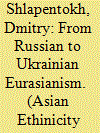

|
|
|
|
|
| Publication |
2013.
|
| Summary/Abstract |
Eurasianism is a popular creed in post-Soviet Russia. Its supporters believe Russia is a unique blend of Slavic and non-Slavic, mostly Muslim Turkic people. With the rise of Russian nationalism, Muslims were transformed into enemies. It has been a different story in Ukraine, where Russians - 'the old brothers' - became an alien force and Turkic people an acceptable minority. This trend has held for the last 20 years regardless of all vacillations in Ukrainian political/cultural development.
|
|
|
|
|
|
|
|
|
|
|
|
|
|
|
|
| 4 |
ID:
092327
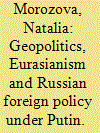

|
|
|
|
|
| Publication |
2009.
|
| Summary/Abstract |
Although the "rise" of geopolitics and Eurasianism to discursive prominence within the Russian post-Soviet foreign policy discourse has been widely discussed in the literature, their relegation to the margin of the said discourse a decade later has passed largely unnoticed. Only a few attempts to account for this fall from grace exist, and their proponents agree that Eurasianism had become a spent force in Russian politics by the time of President Putin's ascendancy to power because it failed to sustain a coherent foreign policy, particularly following Russia's failure to restore its pre-eminence in the post-Soviet space. On the level of practical geopolitical reasoning, therefore, Eurasianism is reduced to geopolitics, i.e. the politics of spheres of influence and hegemonic spatial control, while Eurasian identity construction is dismissed as unconvincing, strategic and self-serving. However, this article attempts to provide an alternative explanation for the decline of Eurasianism under Putin - the one that focuses on the attempt within post-revolutionary and post-Soviet Eurasianism to theorise both a unique identity and a credible ideology, i.e., what Eurasianists themselves termed "ideocracy". Therefore, a classification of Russian geopolitical thinking is provided according to the different ways in which the intellectual legacy of classical Eurasianism is being invoked and appropriated. Both 'traditionalist' and 'modernist' geopoliticians invoke Russia's Eurasian identity in order to answer the practical question 'how?' - how Russia should preserve its territorial integrity and enhance its international standing. Proponents of 'civilisational' geopolitics, on the contrary, employ the ideational resources of classical Eurasianism in order to answer the question 'what?': what is Russia in the post-Cold War world. It is argued that the answer to this latter question - given that two possible attempts to apply Eurasian ideocracy to post-Soviet conditions have developed - is a necessary step to answering the question "why?": why Eurasianism has been effectively sidelined under Putin turning into a metaphorical dog that did not bark.
|
|
|
|
|
|
|
|
|
|
|
|
|
|
|
|
| 5 |
ID:
153706
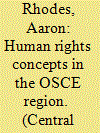

|
|
|
|
|
| Summary/Abstract |
The Helsinki Accords resonated with dissident movements in the Soviet Bloc that had reconstructed a classical liberal approach to human rights. Human rights campaigns on both sides of the Iron Curtain emphasized civil and political rights. But human rights revisionism, expanding the scope of human rights, was growing in international institutions. In 1993, the international community embraced the concept of the ‘indivisibility’ of human rights. An expansive, ‘post-modern’ vision of human rights de-emphasized the protection of basic individual freedoms, while expanding global regulation. A strong moral and political challenge to classical human rights has emerged in the form of Eurasianism, a statist doctrine that denies the existence of universal human rights and insists that each culture has its own values. The idea of human rights as protections for basic freedoms, diluted and weakened over decades by assaults and compromises, may lack the moral clarity needed to confront the Eurasian challenge.
|
|
|
|
|
|
|
|
|
|
|
|
|
|
|
|
| 6 |
ID:
127643
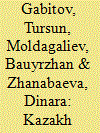

|
|
|
|
|
| Publication |
2013.
|
| Summary/Abstract |
This article focuses on determining the place and role of the Kazakh culture in the Eurasian civilizational area. It examines the choice of sociocultural development models for the Republic of Kazakhstan in globalization and localization conditions. The Kazakh culture is identified in the context of its interaction with the nomadic, Islamic, Russian, Central Asian, and East Asian civilizations. It analyzes the role of cultural factors in building the new post-Soviet Central Asian states.
|
|
|
|
|
|
|
|
|
|
|
|
|
|
|
|
| 7 |
ID:
148724
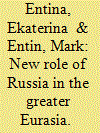

|
|
|
|
|
| Summary/Abstract |
Key ideas associated with Eurasianism were developed in the 19th century. The narrative of classical Eurasianism in the 1920s was developed to explain that Western civilisation was not superior to other civilisations. Eurasia is the middle continent between other parts of Europe and Asia. There are historical, geographical, and cultural impetuses here which push nations to different forms of association. However, the dissolution of the USSR gave birth to new ideologies and political theories of Eurasianism. The most positive one was extensively developed by the President of Kazakhstan Nursultan Nazarbaev. Today, we witness the fourth stage of the development of Eurasianism.
|
|
|
|
|
|
|
|
|
|
|
|
|
|
|
|
| 8 |
ID:
112963
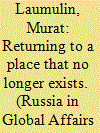

|
|
|
|
|
| Publication |
2012.
|
| Summary/Abstract |
Entire generations of people born in the former Soviet Union would wholeheartedly support unification, but a logical question arises: With whom are we going to unite? A country that has assimilated the worst from Western capitalism, rampant with xenophobia and domestic racism, and which is suffering from a demographic and technological decline? A country whose economy is controlled by the mafia and oligarchs?
|
|
|
|
|
|
|
|
|
|
|
|
|
|
|
|
| 9 |
ID:
118418
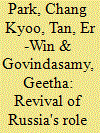

|
|
|
|
|
| Publication |
2013.
|
| Summary/Abstract |
The death of North Korean leader Kim Jong-il in 2011 presents Russian president Vladimir Putin with an opportunity to regain influence on the Korean peninsula. Over the long term, Russia may reemerge as a great power in the Asia Pacific region in line with Russian geostrategic interests. Since the collapse of the Soviet Union, Russia has been marginalized on major issues in Northeast Asia. The prospect of a consistent, long-term North Korea policy under Putin places Moscow in a strong position to sustain the process of engagement with North Korea. More significantly, it serves Moscow's demographic, economic, and security interests to be a positive influence in the region in order to regain a diplomatic role in any security initiatives concerning the Korean peninsula. In this article, we argue that if and when the Russian Far East is developed, Moscow would be in a position to offset the regional strategic and economic dominance of the United States and China.
|
|
|
|
|
|
|
|
|
|
|
|
|
|
|
|
| 10 |
ID:
141735
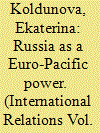

|
|
|
|
|
| Summary/Abstract |
Russia has a dual self-perception deeply rooted in its historical development. It is represented in two competing traditions of defining Russia’s position in the world. While some parts of society view Russia as a part of Europe, others believe that it is a distinct Eurasian power. An academic view – although one less popular among Moscow foreign policy-making elites – defines Russia as a Euro-Pacific power possessing vital interests in Europe and the Asia-Pacific. This article examines recent developments in Russian foreign policy decision-making with a view to interpreting how contemporary dilemmas have featured in the adaptation and rearticulation of the two predominant identity traditions by Russian foreign policy actors since 1991. It also analyses how the beliefs of the situated agents, namely, political elites and bureaucratic, intellectual and business actors at various levels, have contributed to Russia’s interpretation of recent global power shifts. These are examined with particular reference to the ongoing crisis in Russia’s relations with the West, sharply accented in Ukraine, and the emerging significance of the Asia-Pacific for thinking about the Russian foreign policy and its role in the world.
|
|
|
|
|
|
|
|
|
|
|
|
|
|
|
|
| 11 |
ID:
102176
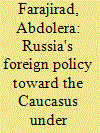

|
|
|
| 12 |
ID:
146301
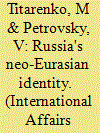

|
|
|
|
|
| Summary/Abstract |
RUSSIA'S STRATEGIC TURN to the East has revived the academic and social-political discussion about our country's Eurasian self-determination and an adequate understanding of its Eurasian identity. It seems, however, that we have not yet grasped the true philosophical, geoeco-nomic and geopolitical significance of Russian Eurasianism; we should arrive at its comprehensive understanding and formulate its definition.
|
|
|
|
|
|
|
|
|
|
|
|
|
|
|
|
| 13 |
ID:
187483
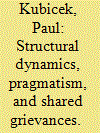

|
|
|
|
|
| Summary/Abstract |
In recent years, closer Turkish-Russian relations have captured the attention of both academics and policymakers, but also seem rather paradoxical as the two countries find themselves on opposite sides of conflicts in Syria, Libya, and the Caucuses. This paper evaluates how effective neo-realist (structural) and ideational (constructivist) theories of international relations are in explaining the Turkish-Russian relationship. Ultimately, this paper finds more merit in accounts grounded in neo-realism that can capture aspects of both cooperation and conflict/competition in the relationship.
|
|
|
|
|
|
|
|
|
|
|
|
|
|
|
|
|
|
|
|
|